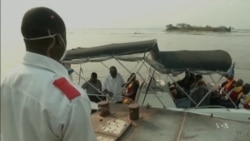The director of the U.S. Centers for Disease Control (CDC), Tom Frieden, warned that the Ebola outbreak in West Africa will worsen in coming weeks “significantly.” Frieden said a “massive” global response is needed now to combat what he calls the world’s first Ebola epidemic.
Frieden, who just returned from the most affected West African countries of Sierra Leone, Guinea and Liberia, said that despite tremendous efforts by health care workers, the number of Ebola cases continues to increase rapidly. Speaking at CDC headquarters in Atlanta, Frieden said the number of cases, now more than 3,000, is expected to increase rapidly in coming weeks.
"There is a window of opportunity to tamp this down, but that window is closing. We need action now to scale up the response," said Frieden.
Frieden called the current outbreak the first epidemic of Ebola the world has ever known.
"It’s spreading from just two roots; people caring for other people in hospitals or homes and unsafe burial practices where people may come into contact with body fluids from somebody who’s died from Ebola. That is really the Achilles’ heel of this virus. We know how it spreads. We know how to stop it from spreading. The challenge is to do that everywhere it’s needed," said Frieden.
Frieden warned that the number of Ebola cases is rising so rapidly that each day of delay in responding to it makes it more difficult to stop it from spreading. The CDC director said what is needed is a major inflow of resources, technical experts and a global, coordinated, unified approach because this is, he pointed out, not just an African problem, but a global problem.
A similar message was conveyed to the United Nations Tuesday. Joanne Liu, president of the medical charity Doctors without Borders (MSF), said the world is losing the battle to contain Ebola. She called the virus a transnational threat.
"Riots are breaking out, isolation centers are overwhelmed, and health workers on the front lines are becoming infected and are dying in shocking numbers. Others have fled in fear leaving people without care for even the most common illnesses [and] entire health systems have crumbled," said Liu.
Liu said isolation centers are now reduced to places where people go to die alone, where little more than palliative care is offered.
David Nabarro, a British physician who has been designated the UN’s System Coordinator on Ebola, also visited West Africa. He said every nation must ask what it can do to help.
“If we don’t get on top of this outbreak as a global community, then this could affect all of us in unexpected ways. It’s not somebody else’s problem, it’s our collective problem," said Nabarro.
Before leaving for Europe, President Obama videotaped a message to West Africa.
"On behalf of the American people, I want you to know that our prayers are with those of you who have lost loved ones during this terrible outbreak of Ebola," said Obama.
Obama sought to dispel myths surrounding the spread of Ebola, saying infection only comes through contact with someone or something infected by the virus or the body fluids of someone who has died of Ebola.
"That’s why the disease is continuing to spread where patients are being cared for at home or during burials when family and friends lay their loved ones to rest," said Obama.
He said people can respect their traditions and honor their loved ones “without risking the lives of the living.” The president said stopping the disease will not be easy, but it can be done cooperatively.
U.S. health officials Tuesday announced a federal contract with California-based Mapp Biopharmaceuticals to speed development of ZMapp, an experimental drug that has yet to go through extensive human testing but has been rushed into use despite its limited availability.
Two American missionaries working in Liberia who contracted Ebola were given the drug and have recovered from their illnesses. One of those health care workers, Kent Brantly, told NBC television Tuesday he was not sure he would survive.
"I don’t think they ever said, ‘Kent, you are about to die.’ But I felt like I was about to die. And, I said to the nurse who was taking care of me, ‘I’m sick, I have no reserve and I don’t know how long I can keep this up,’" recalled Brantly.
Brantly, who has been released from Emory University Hospital in Atlanta, said he is in “tearful prayer” for yet another American doctor, identified only as a male obstetrician, who has contracted Ebola in Liberia. He has isolated himself since the symptoms appeared.
All three Americans, including Nancy Writebol, work for the North Carolina-based SIM International mission.





